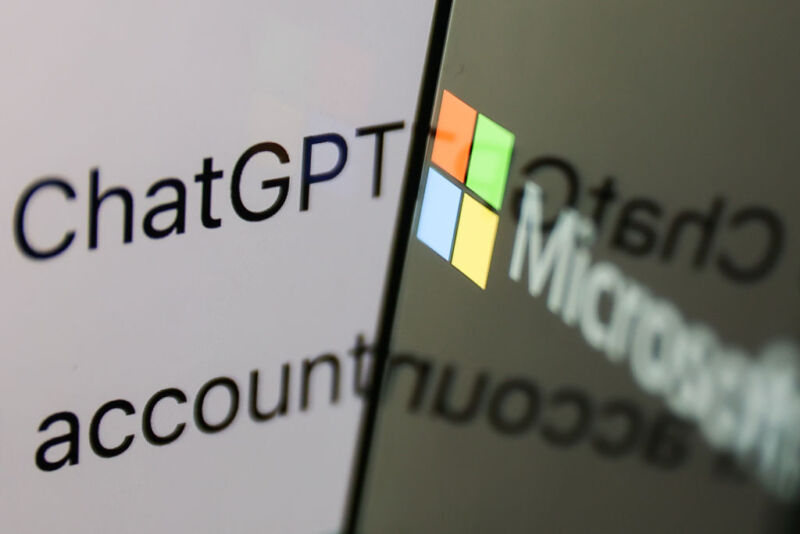
Tension and confusion have made the partnership between Microsoft and OpenAI "awkward," people familiar with the matter revealed in a Wall Street Journal report today.
Not only has this tension and confusion extended to Microsoft's internal AI team—which apparently is dealing with budget cuts and limited access to OpenAI technology—but sources said it also clouded Microsoft's controversial rollout of AI-powered Bing search last February. At that time, Bing was found to be vulnerable to prompt injection attacks revealing company secrets and providing sometimes inaccurate and truly unhinged responses to user prompts.
According to WSJ, OpenAI warned Microsoft "about the perils of rushing to integrate OpenAI’s technology without training it more" and "suggested Microsoft move slower on integrating its AI technology with Bing." A top concern for OpenAI was that Bing's chatbot, Sydney, might give inaccurate or unhinged responses, but this early warning seemingly was easily ignored by Microsoft.
In a Wired interview published today, Microsoft CEO Satya Nadella suggested that any hiccups with Sydney at first were just part of Microsoft's plan for training the chatbot to respond to real-world prompts that couldn't be tested in a lab.
"We did not launch Sydney with GPT-4 the first day I saw it, because we had to do a lot of work to build a safety harness," Nadella told Wired. "But we also knew we couldn't do all the alignment in the lab. To align an AI model with the world, you have to align it in the world and not in some simulation."
So that's partly why Microsoft rushed ahead anyway, but sources told WSJ that the rush was also partly due to Microsoft executives who had "misgivings about the timing of ChatGPT’s launch last fall."
Because OpenAI started ChatGPT's public testing while Microsoft was still working on integrating OpenAI tech into Bing, tension seemingly spiked between the partners, who also stood as rivals in an AI race to capture the world's attention.
As ChatGPT's success grew, some Microsoft employees raised concerns that ChatGPT was stealing Bing's "thunder," WSJ reported. Others sensibly posited that Microsoft could learn valuable lessons ahead of Bing's rollout from ChatGPT's early public testing. While Microsoft watched its partner grow ever more popular by the minute, it's easy to see why the company placed more urgency on AI-powered Bing's release. Public interest in the technology was there, and Microsoft wanted to be a bigger part of the conversation.
Of course, ChatGPT ultimately won the AI race, instantly attracting the fastest-growing user base in history. Meanwhile, "the new Bing," released a month later, "has yet to come close to the breakout success of ChatGPT," WSJ reported. Citing data from analytics firm YipitData, WSJ reported that ChatGPT "has nearly double the average number of daily search sessions as Bing search does." YipitData reported that ChatGPT has reached 200 million monthly users, while Bing hit 100 million daily active users in March.
ChatGPT and Bing were later criticized for launching chatbots guilty of making up stuff, lying, and other issues that many users didn't expect to encounter. OpenAI is still looking for ways to limit chatbots' so-called "hallucinations," CNBC reported in May. In February, Microsoft had to update Bing to limit long conversations until the company could find a better solution. Even after working on the issue for months, though, The Verge reported that—while Bing may respond with fewer unhinged outbursts during long conversations—"it still often gets things wrong."
Nadella told Wired that Microsoft has found "very practical stuff that reduces hallucination" and that seemingly serves as a stopgap until the technology improves and new solutions emerge.
Nadella also said that sometimes "hallucinations" are desirable, though, and any solutions to limit "hallucinations" should be mindful that users should maintain the option to use AI chatbots for creative purposes, too.
OpenAI did not immediately respond to Ars' request to comment. A Microsoft spokesperson told Ars that another reason why the company launched the new Bing preview was to respond to half of all standard web searches that typically go unanswered. Microsoft is also continually seeking to improve the authority and credibility of the web results that underpin their chat mode response, the spokesperson said, and stands prepared to quickly fix unanticipated issues that arise.
"Our approach is to make AI tools available to people responsibly with guardrails in place so we can get feedback, continue to learn, and quickly improve these tools, as we have done with Bing," Microsoft's spokesperson told Ars.
reader comments
72